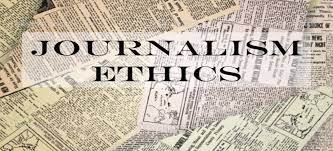Editorial
Chasing profit at the expense of journalistic ethics

In today’s fast-paced media land¬scape, the importance of journal¬istic ethics in ensuring responsible reporting and truth preservation cannot be overstated.
However, a worrying trend has emerged where the pursuit of profit takes precedence over maintaining journalistic integrity. Some media outlets, seeking to attract more viewers and readers, have resorted to sensationalising news and presenting misleading content. This shift has raised questions about the impact on truth and democracy.
Misinformation and clickbait journalism can erode public trust and social cohesion, posing threats to an informed society. To counter these challenges, a return to ethical jour¬nalism, emphasising unbiased report¬ing and media literacy, is crucial to preserving the credibility and essen¬tial role of the media in our society.
Journalism has long been consid¬ered the Fourth Estate, a guardian of democracy that plays a pivotal role in disseminating accurate informa¬tion, fostering public discourse, and holding those in power accountable. However, with the emergence of digital media and the race for prof¬itability, the landscape of journalism has undergone a transformation. The traditional model of news consump¬tion has given way to online platforms where clicks and views often dictate success. As a result, media outlets find themselves navigating the fine line between attracting audiences and upholding ethical standards.
One of the most alarming conse¬quences of profit-driven journalism is the rise of clickbait content. In a bid to capture the attention of online users, headlines are crafted to be sensational and provocative, some¬times at the expense of accuracy and context.
This has given rise to a culture of misinformation, where readers are enticed by eye-catching headlines that may not align with the actual content of the article. Consequently, the dissemination of false or mislead¬ing information becomes rampant, undermining the public’s trust in journalism.
The consequences of profit-driven journalism extend beyond the realm of media. In an era of disinformation and misinformation, a society heavily relies on credible journalism to re¬main well-informed and make educat¬ed decisions.
When journalism is driven by profit rather than journalistic ethics, the integrity of reporting is compromised, leading to a less informed and poten¬tially divided society.
To confront this challenge, a con¬certed effort is required from media organisations, journalists, and the public. Media outlets must prioritise quality journalism that emphasises thorough research, fact-checking, and impartial reporting. By building a loyal audience based on trust and credibility, media organisations can navigate the digital landscape without sacrificing ethical standards.
Embracing ethical practices, fostering media literacy, and priori¬tising accurate reporting are essential steps towards restoring public trust and ensuring that journalism remains a reliable guardian of democracy in the digital age. By returning to the core values of responsible journalism, media organisations can reclaim their role as purveyors of truth and serve as a unifying force in an increasingly polaried world.
Twum Petra Nana Boakyewaa, Ghana Institute of Journalism
Editorial
Concern over mentally ill persons roaming Kwame Nkrumah Circle Interchange
Dear Sir
I write to express my concern over the growing number of mentally ill individuals roaming the Kwame Nkrumah Circle Interchange in Accra.
This area, a vital transportation hub and commercial centre, has increasingly become home to several persons visibly suffering from mental health issues, often without adequate care or supervision.
This situation poses risks both to the affected individuals and the general public. Some of these individuals are exposed to traffic hazards, unsanitary conditions, and in some cases, hostile treatment from passersby.
There have also been reports of occasional erratic behaviour, which causes fear and discomfort among commuters and vendors.
Mental health is a public health issue, and these individuals deserve compassion, medical attention, and a safe environment.
I urge the Ministry of Health, the Accra Metropolitan Assembly, and relevant NGOs to collaborate on a sustainable solution including mental health outreach programmes, rehabilitation, and safe housing.
Kwame Nkrumah Circle should be a symbol of progress, not a place where the vulnerable are left to struggle. Let us act with urgency and humanity.
From John Boateng
Kwame Nkrumah Circle
Editorial
Parents should encourage their wards writing BECE
Dear Editor,
AS the 2025 Basic Education Certificate Examination (BECE) takes off across the country starting Wednesday, I write to encourage all candidates taking part in this important step in their academic journey.
Out of a total of 603,328 candidates taking the examination this year, 306,078 are females, whiles the rest 297,250 are males.
Over the years, the examination begins on Monday and ended on Friday but per the timetable, this year’s candidates started on Wednesday and will end next week.
The BECE is not just an exam, it is a milestone from one stage to another. It represents years of hardwork, dedication and the dreams of countless students who hope to continue their education and build a brighter future.
This is where the role of parents, teachers and society become beneficial. Let us offer not only academic support but emotional encouragement to them.
I also appeal to educational authorities to ensure fairness, proper supervision and transparency throughout the examination period.
The journey may be challenging, but with time, focus and discipline they can make it.
I wish to use this platform to wish all of them well.
Naa Koshie, Teshie






